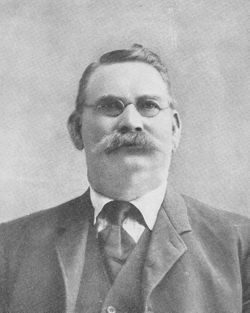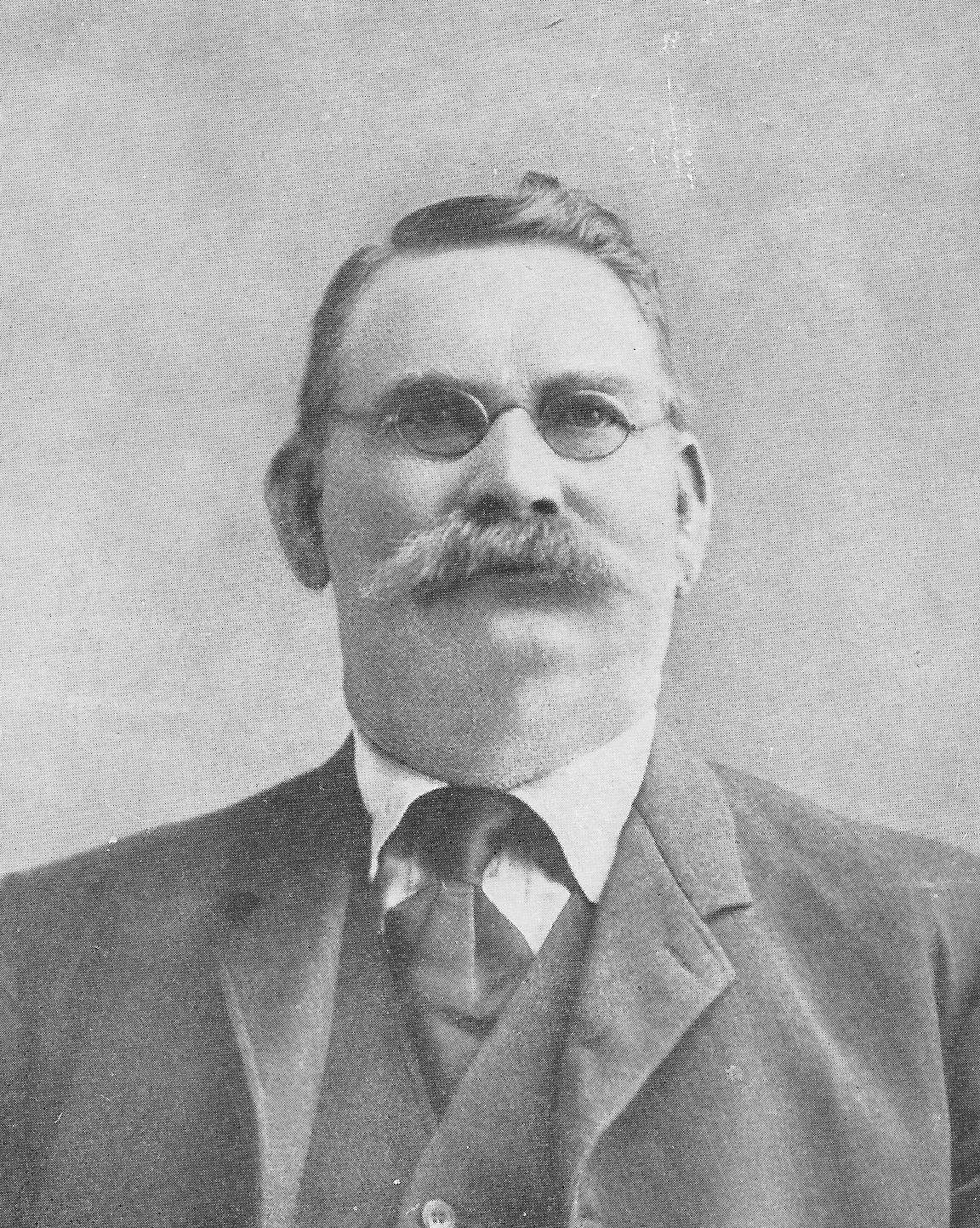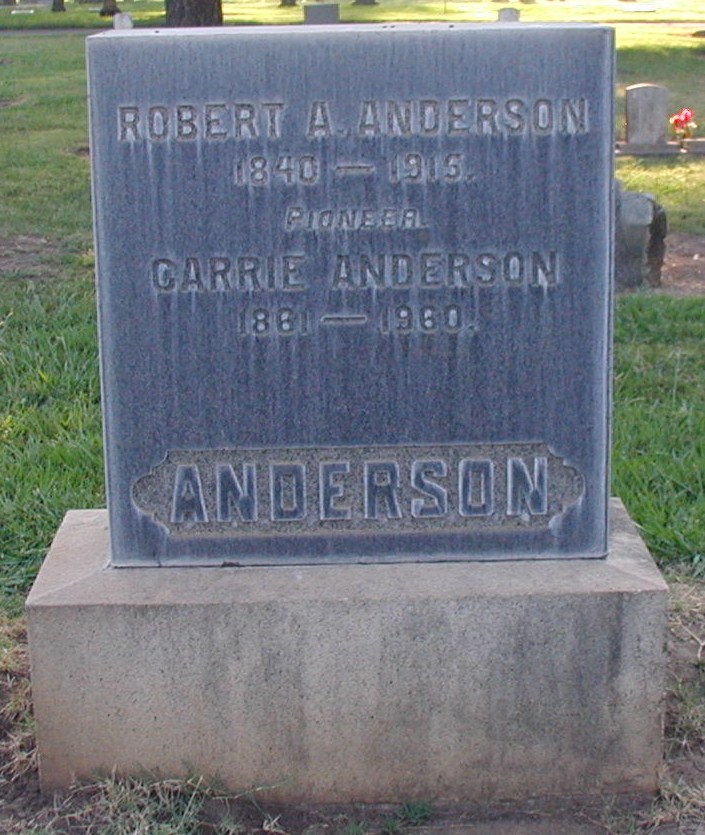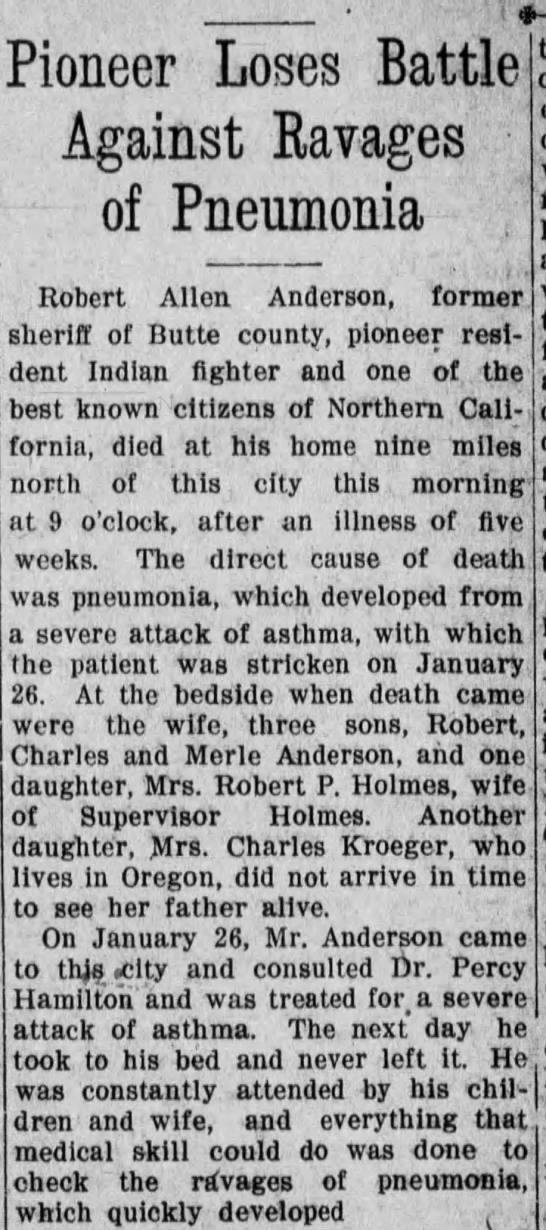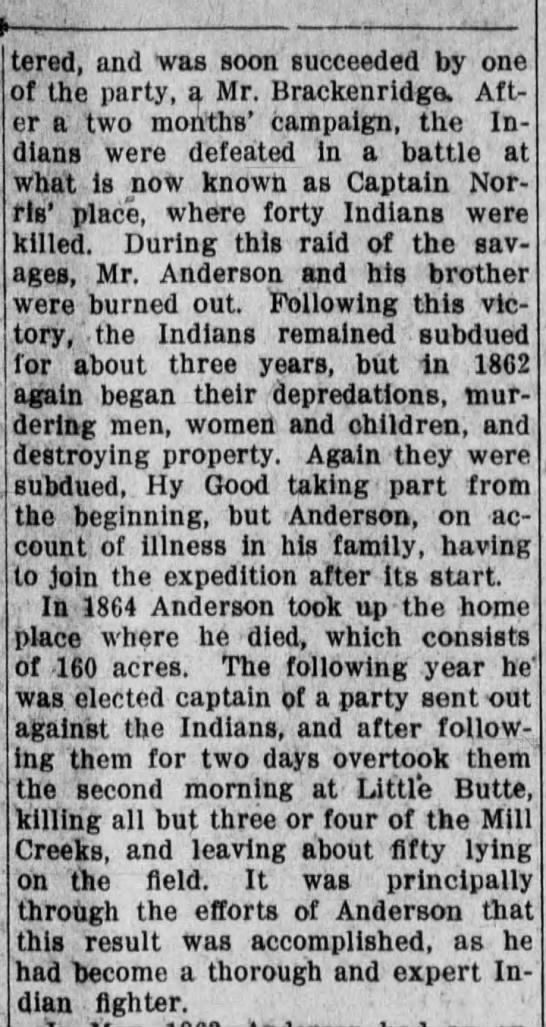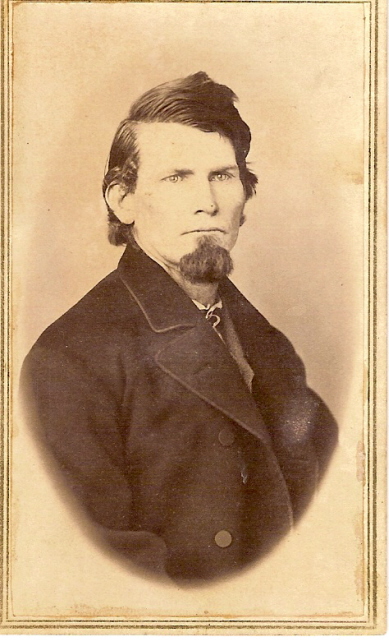A native of Missouri, he was born on March 27, 1840, in Polk County. He was a son of William and Mary (Coggins) Anderson, both natives of Tennessee. In 1836 William Anderson left Memphis, where he was born, and settled in Polk County, Mo., where he farmed until his death. His wife died in Kansas. Robert A., or Bob, as he was best known by all his friends, was the youngest of five children and he received but a limited education. At an early age he was apprenticed to learn the trade of stone mason, one of his principal occupations being the building of brick chimneys. He and J. W. B. Montgomery were boyhood friends in Missouri, so in 1857, with him and a brother, A. J. (Jack) Anderson, aged nineteen years, Bob Anderson being but seventeen, he left his native state and started across the plains with ox teams. They were bringing a band of cattle and their party was augmented from time to time until it became a very large one and they had considerable trouble with the Indians and the Mormons en route. Jack Anderson remained in California three years, then made his way to the headwaters of the Missouri River in Montana, where he built a canoe and floated down the stream, traveling only at night in order to avoid the hostile Indians, until he reached the settlements in Missouri. He was married in Kansas and lived there until 1881, when he removed to Pendleton, Ore., where he spent his last days.
Upon arriving in California, Bob Anderson mined for a short time on the North Fork of Feather River and then engaged in raising garden truck to supply the miners and any others who could be found to buy. He was fortunate in having an ox team with which to market his produce and made one trip as far as the mountains in Trinity County. He eventually sold out and then engaged in the stock business on Deer Creek, in Tehama County, with a Mr. Rountree for a partner. The deep snow of 1861 put them out of business.
The same year that Mr. Anderson started farming the Indians went on the warpath, which was the beginning of hostilities that lasted until 1865. In 1858 the governor sent troops and scouts to hunt them down, but they failed in their efforts, and the following year six men, among them Mr. Anderson, were detailed by the settlers for the work. General Kibbey sent Captain Burns to command the party, but he was unable to withstand the hardships of such a campaign and he was succeeded by one of the party. After a two months’ campaign the Indians were defeated in a battle on the site of what is now the Norris ranch, where forty Indians were killed. During the raids of the savages Mr. Anderson and his partner were burned out. The Indians remained quiet for about three years, but in 1862 they again began their depredations, murdering men, women and children and destroying property. Again they were subdued, Mr. Anderson being a member of that expedition.
In 1864, Mr. Anderson took up one hundred sixty acres of land, the nucleus of his holdings, which in time amounted to some fifteen hundred acres of good farming land, located nine miles north of Chico. The following year he was elected Captain of a party sent out against the Indians; on the morning of the second day the Indians were encountered, and a battle ensued in which all but three or four of the Indians were killed, some forty or fifty being left on the ground where they had fallen. In was principally through the efforts of Bob Anderson that this result was accomplished, as he had become an expert Indian fighter and was familiar with the habits, signs and language of the Mill Creek Indians and could trail them over the mountains where another frontiersman would fail. In May, 1863, Mr. Anderson had an exciting adventure with the Indians, one of whom had stolen a horse from his father-in-law who lived near by. With two other men he set out to trail the savages and when he came up with them his companions were too scared to render him any aid so he fought twenty-seven of them alone. He killed seven of them and recovered the horse.
Mr. Anderson was married twice. His first marriage was in 1861, when he was united with Sarah J. Scott, a native of Illinois, who died in California. They had the following children: Lydia, Mary, Dora, Cora, and an infant, who are all deceased; Alice, who married R. P. Holmes of Chico; Robert N., who is a rancher and resides in Marysville; Minnie, who is Mrs. Kruger of Marshfield, Ore.; and Charles P., farming near Chico. The second marriage, which occurred in San Francisco, united him with Mrs. Carrie (Hunder) Smith, a native of Portland, Ore., and a daughter of Charles Hunder, a German who came to the United States and made settlement in Belleville, Ill., with his parents when he was a boy of about sixteen years of age. He grew up there and was married to Miss Amelia Cramer, who was also born in Germany. Mr. Hunder was engaged in the hardware business in Belleville, then upon moving to Portland, Ore., he still continued the business, as he did when he moved to Vancouver, Wash. He was also an employee in the office of the county clerk of Clarke County, Wash., for some years. He spent his last days with his daughter, Mrs. Bob Anderson on the old ranch, while his widow survived him and died in Washington.
There are three daughters and one son who survive of this family: Carrie, Mrs. Anderson; Herman, of Portland; May, wife of Dr. Selwood, of Portland; and Berka, Mrs. Charles Ward, of Oroville. Mr. and Mrs. Bob Anderson had one child, a son Merle, who is engaged in ranching and assisting his mother with her ranch.
Bob Anderson was an active member of the Knights of Pythias, and Chico Lodge, No. 423, B. P. O. Elks. He was a Republican in politics and an active worker for the best interests of his party in Northern California, particularly in Butte County. He was elected sheriff of the county in 1888 and served for two terms; he was nominated for that office five times but failed of election three times. He was widely and favorably known, and his name was a terror to the criminal element. He was a kindly man and beloved by all who knew him for the part he took as a man and an upbuilder. At his passing the state of California lost another of her stanch pioneer builders.
Source: "History of Butte County, Cal.," by George C. Mansfield, Pages 635-637, Historic Record Co, Los Angeles, CA, 1918.
A native of Missouri, he was born on March 27, 1840, in Polk County. He was a son of William and Mary (Coggins) Anderson, both natives of Tennessee. In 1836 William Anderson left Memphis, where he was born, and settled in Polk County, Mo., where he farmed until his death. His wife died in Kansas. Robert A., or Bob, as he was best known by all his friends, was the youngest of five children and he received but a limited education. At an early age he was apprenticed to learn the trade of stone mason, one of his principal occupations being the building of brick chimneys. He and J. W. B. Montgomery were boyhood friends in Missouri, so in 1857, with him and a brother, A. J. (Jack) Anderson, aged nineteen years, Bob Anderson being but seventeen, he left his native state and started across the plains with ox teams. They were bringing a band of cattle and their party was augmented from time to time until it became a very large one and they had considerable trouble with the Indians and the Mormons en route. Jack Anderson remained in California three years, then made his way to the headwaters of the Missouri River in Montana, where he built a canoe and floated down the stream, traveling only at night in order to avoid the hostile Indians, until he reached the settlements in Missouri. He was married in Kansas and lived there until 1881, when he removed to Pendleton, Ore., where he spent his last days.
Upon arriving in California, Bob Anderson mined for a short time on the North Fork of Feather River and then engaged in raising garden truck to supply the miners and any others who could be found to buy. He was fortunate in having an ox team with which to market his produce and made one trip as far as the mountains in Trinity County. He eventually sold out and then engaged in the stock business on Deer Creek, in Tehama County, with a Mr. Rountree for a partner. The deep snow of 1861 put them out of business.
The same year that Mr. Anderson started farming the Indians went on the warpath, which was the beginning of hostilities that lasted until 1865. In 1858 the governor sent troops and scouts to hunt them down, but they failed in their efforts, and the following year six men, among them Mr. Anderson, were detailed by the settlers for the work. General Kibbey sent Captain Burns to command the party, but he was unable to withstand the hardships of such a campaign and he was succeeded by one of the party. After a two months’ campaign the Indians were defeated in a battle on the site of what is now the Norris ranch, where forty Indians were killed. During the raids of the savages Mr. Anderson and his partner were burned out. The Indians remained quiet for about three years, but in 1862 they again began their depredations, murdering men, women and children and destroying property. Again they were subdued, Mr. Anderson being a member of that expedition.
In 1864, Mr. Anderson took up one hundred sixty acres of land, the nucleus of his holdings, which in time amounted to some fifteen hundred acres of good farming land, located nine miles north of Chico. The following year he was elected Captain of a party sent out against the Indians; on the morning of the second day the Indians were encountered, and a battle ensued in which all but three or four of the Indians were killed, some forty or fifty being left on the ground where they had fallen. In was principally through the efforts of Bob Anderson that this result was accomplished, as he had become an expert Indian fighter and was familiar with the habits, signs and language of the Mill Creek Indians and could trail them over the mountains where another frontiersman would fail. In May, 1863, Mr. Anderson had an exciting adventure with the Indians, one of whom had stolen a horse from his father-in-law who lived near by. With two other men he set out to trail the savages and when he came up with them his companions were too scared to render him any aid so he fought twenty-seven of them alone. He killed seven of them and recovered the horse.
Mr. Anderson was married twice. His first marriage was in 1861, when he was united with Sarah J. Scott, a native of Illinois, who died in California. They had the following children: Lydia, Mary, Dora, Cora, and an infant, who are all deceased; Alice, who married R. P. Holmes of Chico; Robert N., who is a rancher and resides in Marysville; Minnie, who is Mrs. Kruger of Marshfield, Ore.; and Charles P., farming near Chico. The second marriage, which occurred in San Francisco, united him with Mrs. Carrie (Hunder) Smith, a native of Portland, Ore., and a daughter of Charles Hunder, a German who came to the United States and made settlement in Belleville, Ill., with his parents when he was a boy of about sixteen years of age. He grew up there and was married to Miss Amelia Cramer, who was also born in Germany. Mr. Hunder was engaged in the hardware business in Belleville, then upon moving to Portland, Ore., he still continued the business, as he did when he moved to Vancouver, Wash. He was also an employee in the office of the county clerk of Clarke County, Wash., for some years. He spent his last days with his daughter, Mrs. Bob Anderson on the old ranch, while his widow survived him and died in Washington.
There are three daughters and one son who survive of this family: Carrie, Mrs. Anderson; Herman, of Portland; May, wife of Dr. Selwood, of Portland; and Berka, Mrs. Charles Ward, of Oroville. Mr. and Mrs. Bob Anderson had one child, a son Merle, who is engaged in ranching and assisting his mother with her ranch.
Bob Anderson was an active member of the Knights of Pythias, and Chico Lodge, No. 423, B. P. O. Elks. He was a Republican in politics and an active worker for the best interests of his party in Northern California, particularly in Butte County. He was elected sheriff of the county in 1888 and served for two terms; he was nominated for that office five times but failed of election three times. He was widely and favorably known, and his name was a terror to the criminal element. He was a kindly man and beloved by all who knew him for the part he took as a man and an upbuilder. At his passing the state of California lost another of her stanch pioneer builders.
Source: "History of Butte County, Cal.," by George C. Mansfield, Pages 635-637, Historic Record Co, Los Angeles, CA, 1918.
Family Members
Sponsored by Ancestry
Advertisement
Records on Ancestry
Advertisement
